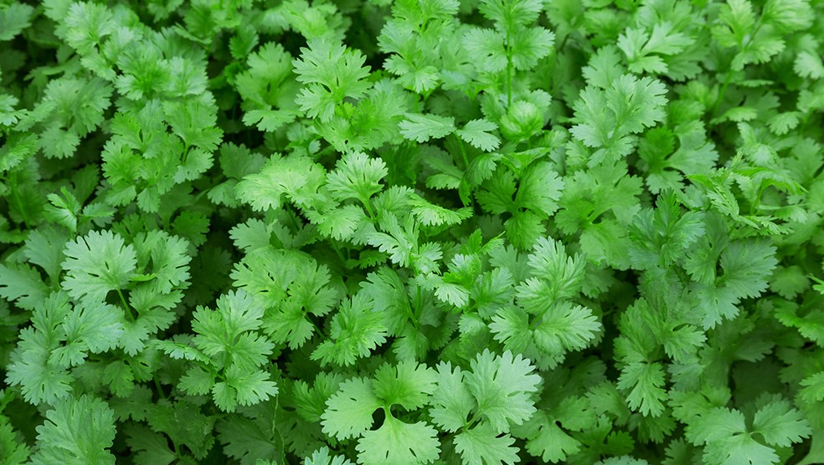Coriander, commonly known as cilantro or dhania, is not just a flavorful herb that adds depth to your dishes, but there is also a myriad of health benefits of coriander that have been cherished for centuries. This unassuming herb is a staple in various cuisines worldwide and is often used as a garnish, flavor enhancer, or even a key ingredient in many dishes. However, its health-promoting properties go beyond its culinary uses, making it a valuable addition to your diet. Let’s delve into the surprising health benefits of coriander.

1. Rich in Nutrients
Coriander is a nutritional powerhouse, loaded with vitamins and minerals. It contains vitamins A, C, and K, as well as important minerals like potassium, calcium, magnesium, and iron. These coriander benefits play essential roles in maintaining overall health, supporting immune function, and promoting bone health.
2. Digestive Aid
Traditional uses for coriander include aiding digestion. It contains natural enzymes that help promote digestion by aiding in the breakdown of food. It can alleviate digestive discomfort, reduce bloating, and ease indigestion. Consuming coriander regularly may contribute to a healthier gut.
3. Anti-Inflammatory Properties
Health benefits of coriander contain active compounds with anti-inflammatory properties, such as quercetin and tocopherols. These substances aid in reducing bodily inflammation, which is associated with several chronic disorders. Incorporating coriander into your diet may contribute to lowering inflammation and its associated health risks.
4. Antioxidant Powerhouse
Antioxidants are essential for scavenging the body’s dangerous free radicals. Coriander is rich in antioxidants like beta-carotene and vitamin C, which help protect cells from oxidative stress and potential damage. Regular consumption of coriander may contribute to overall cellular health.
5. Blood Sugar Regulation
Coriander may play a role in regulating blood sugar levels. Some studies suggest that its compounds can stimulate the secretion of insulin and help improve glucose metabolism. However, further research is needed to fully understand its potential in managing diabetes.
6. Heart Health
The heart-healthy properties of coriander are attributed to its ability to lower bad cholesterol (LDL) and increase good cholesterol (HDL). The fiber content in coriander may also aid in reducing cholesterol levels, supporting cardiovascular health.
7. Skin Health
Health benefits of coriander extend to skincare as well. It’s antioxidants and anti-inflammatory properties can help prevent skin aging by combating oxidative stress and promoting a healthy complexion. Additionally, coriander’s essential oils are used in various skincare products for their soothing and rejuvenating effects.
8. Natural Preservative
Coriander’s essential oil has been studied for its antimicrobial properties, which can help preserve food and extend its shelf life. Incorporating coriander into your recipes may have the added benefit of natural food preservation.
9. Chelation of Heavy Metals
Health benefits of coriander has been explored for its potential in chelating heavy metals from the body, including mercury. Some studies suggest that coriander can assist in removing heavy metals by binding to them and aiding in their excretion from the body.
10. Immune System Support
Vitamin C, present in coriander, is known for its immune-boosting properties. Regular usage of the health benefits of coriander can contribute to strengthening your immune system and protecting your body against infections.

Incorporating Coriander into Your Diet
Adding health benefits of coriander to your diet is easy and versatile. You can use fresh coriander leaves as a garnish for various dishes, including salads, soups, and curries. Coriander seeds benefits can be consumed when grounded and used as a spice in cooking or as a seasoning. Coriander leaves nutrition can also be blended into chutneys or added to smoothies for an extra nutrient boost.
Coriander, known for its culinary uses, also has a long history of medicinal applications in traditional medicine systems around the world. Its various parts, including leaves, seeds, and essential oil, have been utilized for the potential health benefits of coriander. Here are some of the medicinal uses of coriander:
- Digestive Aid: Coriander medicinal uses has been traditionally helped to alleviate digestive issues such as bloating, indigestion, and gas. Its natural enzymes assist in breaking down food, promoting better digestion and reducing discomfort.
- Anti-Inflammatory Properties: Coriander contains compounds with anti-inflammatory effects, such as quercetin and cineole. These properties may help reduce inflammation in the body, potentially benefiting conditions like arthritis and inflammatory disorders.
- Cholesterol Management: Coriander seeds have been studied for their potential to lower LDL (bad) cholesterol and increase HDL (good) cholesterol levels. The soluble fiber in coriander can bind to cholesterol in the digestive tract, aiding in its removal from the body.
- Blood Sugar Regulation: Some studies suggest that health benefits of coriander may help regulate blood sugar levels by increasing insulin secretion and improving glucose metabolism. It could be beneficial for individuals with diabetes or those at risk.
- Antioxidant Activity: Coriander is rich in antioxidants like vitamin C and beta-carotene, which help combat oxidative stress and neutralize free radicals in the body. This may contribute to overall health and protection against chronic diseases.
- Antimicrobial Properties: Coriander essential oil has shown antimicrobial activity against various bacteria and fungi. It can be used to inhibit the growth of pathogens and promote better oral hygiene.
- Skin Health: The antimicrobial and anti-inflammatory properties of coriander make it useful in skincare. Health benefits of coriander oil have helped to treat minor skin irritations, acne, and fungal infections.
- Detoxification: Health benefits of coriander have been explored for its potential to help the body detoxify by aiding in the elimination of heavy metals and toxins. Its compounds may have a chelating effect, binding to metals and facilitating their excretion.
- Eye Health: The high vitamin A content in coriander contributes to maintaining good vision and eye health. Vitamin A is essential for the health of the retina and prevention of age-related macular degeneration.
- Nervous System Support: Coriander contains compounds that have a calming effect on the nervous system. It may help reduce anxiety and stress and promote better sleep.
- Menstrual Relief: Health benefits of coriander have been used traditionally to alleviate menstrual discomfort. Its anti-inflammatory and muscle-relaxing properties can help reduce pain and discomfort associated with menstrual cramps.
- Respiratory Health: Coriander’s anti-inflammatory and antimicrobial properties may be beneficial for respiratory health. It can help soothe irritated airways and potentially aid in the management of coughs and colds.
It’s important to note that while there are numerous potential health benefits of coriander, individual responses may vary. Incorporating coriander into your diet in moderation can be a flavorful and nutritious way to potentially support your health. However, if you have specific health concerns or conditions, it’s advisable to consult with a healthcare professional before using coriander for medicinal purposes.

Final Thoughts
Health benefits of coriander are as diverse as its culinary uses. From supporting digestion to providing antioxidant protection, this herb offers a range of reasons to include it in your meals. Whether you’re using it as a garnish or incorporating it into your recipes, coriander can be a delightful and nutritious addition to your diet. As with any dietary change, it’s advisable to consult with a healthcare professional, especially if you have specific health concerns or conditions. Embrace the treasures of nature by making coriander a regular part of your culinary and wellness journey.



